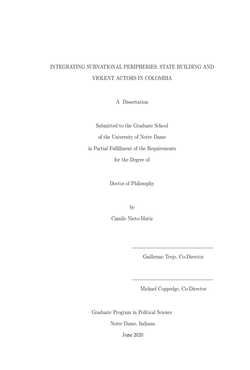By Camilo Nieto-Matiz
Modern states are selective and calculating in their decision to establish their rule throughout the territory. Within the same country, state officials may be willing and capable of making major efforts to deliver public goods and provide security to the population in some areas, while choosing to neglect others and delegate their control to different actors. This dissertation studies why and how political elites differentially build state capacity in peripheral and marginalized areas of a country and in the midst of violent conflicts. What drives incumbents to increase state capacity in peripheral and marginalized areas within a country? What type of state expansion is likely to take place in such areas? My central argument is that exogenous shocks that suddenly increase the political and economic value of peripheral areas may prompt incumbents to invest in state capacity, but whether this capacity increases or not depends on the preexisting configuration of violent actors and local rural elites. On the one hand, the type of violent actor—threatening and non-threatening—exerts a differential effect on state capacity by (i) shaping subnational politicians’ incentives to cooperate with the central state and (ii) establishing collusive agreements with violent actors. In addition, because greater state capacity tends to undermine rural elites’ economic and political power, they will have incentives to oppose greater state presence and—in contexts of insecurity and violence—establish alliances with non-threatening groups. In short, state capacity is likely to be higher in municipalities with weak rural elites and facing threatening violent groups. In contrast, state capacity will be more difficult to attain in areas with stronger rural elites and where violent groups do not pose a major threat to state authority....
Notre Dame, Indiana : University of Notre Dame, 2020. 231p.




